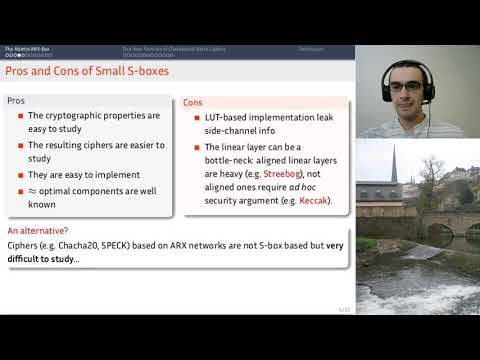Welcome to the resource topic for 2019/1378
Title:
Alzette: a 64-bit ARX-box (feat. CRAX and TRAX)
Authors: Christof Beierle, Alex Biryukov, Luan Cardoso dos Santos, Johann Großschädl, Léo Perrin, Aleksei Udovenko, Vesselin Velichkov, Qingju Wang
Abstract:S-boxes are the only source of non-linearity in many symmetric primitives. While they are often defined as being functions operating on a small space, some recent designs propose the use of much larger ones (e.g., 32 bits). In this context, an S-box is then defined as a subfunction whose cryptographic properties can be estimated precisely. We present a 64-bit ARX-based S-box called Alzette, which can be evaluated in constant time using only 12 instructions on modern CPUs. Its parallel application can also leverage vector (SIMD) instructions. One iteration of Alzette has differential and linear properties comparable to those of the AES S-box, and two are at least as secure as the AES super S-box. As the state size is much larger than the typical 4 or 8 bits, the study of the relevant cryptographic properties of Alzette is not trivial. We further discuss how such wide S-boxes could be used to construct round functions of 64-, 128- and 256-bit (tweakable) block ciphers with good cryptographic properties that are guaranteed even in the related-tweak setting. We use these structures to design a very lightweight 64-bit block cipher (CRAX) which outperforms SPECK-64/128 for short messages on micro-controllers, and a 256-bit tweakable block cipher (TRAX) which can be used to obtain strong security guarantees against powerful adversaries (nonce misuse, quantum attacks).
ePrint: https://eprint.iacr.org/2019/1378
Talk: https://www.youtube.com/watch?v=7WOGx75tUtQ
See all topics related to this paper.
Feel free to post resources that are related to this paper below.
Example resources include: implementations, explanation materials, talks, slides, links to previous discussions on other websites.
For more information, see the rules for Resource Topics .
